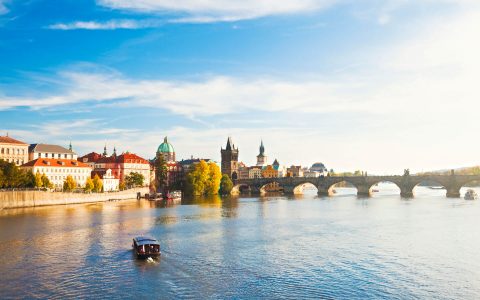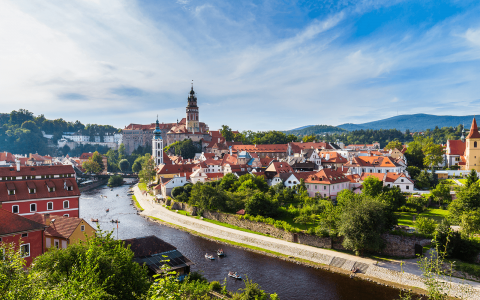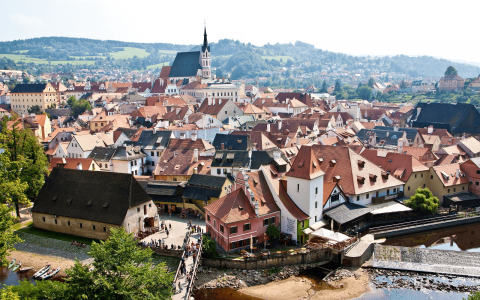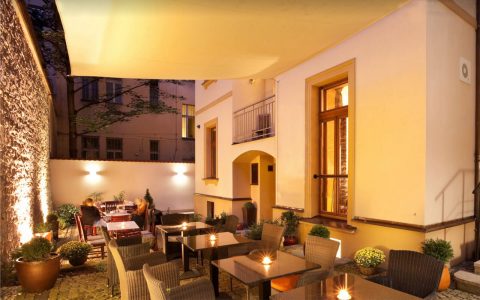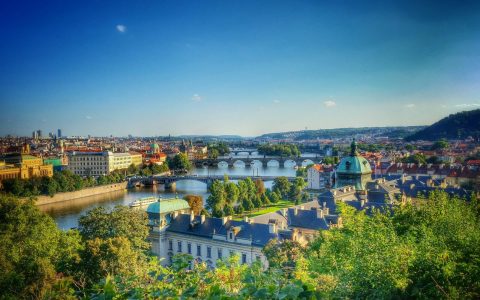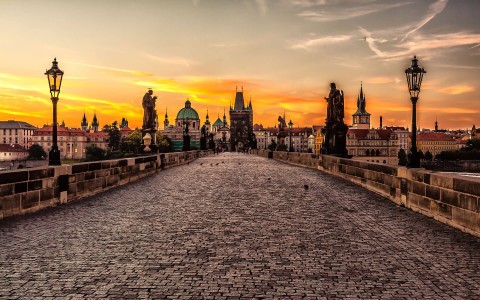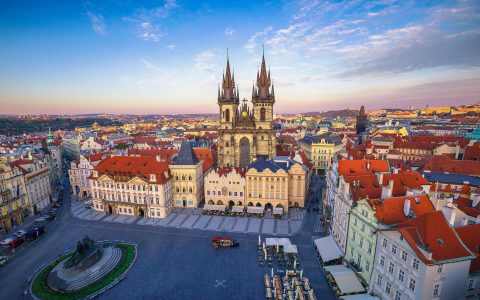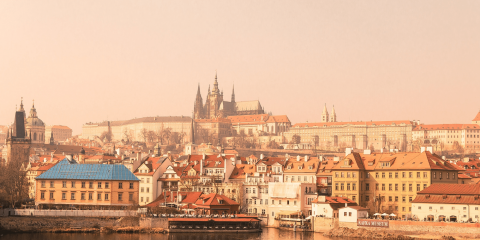Standing In The Shadows of Giants: Franz Kafka’s Prague
In the City of a Hundred Spires, it’s easy to lose yourself in the grandeur of the sights: the Charles Bridge, picturesque buildings lining both sides of the Vltava River, the cobblestone streets, Prague Castle at the top of the hill and the famous confines of the Old Town. But look a little closer and you will find everlasting traces of Prague’s most famous literary son, Franz Kafka.
It’s no small feat to have your last name listed in the dictionary (let’s concede that the term is technically ‘Kafkaesque‘) as signifying “a nightmarishly complex, bizarre, or illogical quality”, nor to be lauded by, oh, you know, no less than Vladimir Nabokov(!) as “the greatest German writer of our time”.

 Born into a middle-class Jewish family in Prague, at the time part of the kingdom of Bohemia, as well a part of the Austro-Hungarian empire, much of Kafka’s fragile psyche and eventual writing was deeply influenced by his father, an authoritarian and domineering household figure. Never married, but engaged on three occasions to two different women, Kafka was also a frequent brothel visitor, and had numerous difficulties reconciling his relationships and intimate life.
Born into a middle-class Jewish family in Prague, at the time part of the kingdom of Bohemia, as well a part of the Austro-Hungarian empire, much of Kafka’s fragile psyche and eventual writing was deeply influenced by his father, an authoritarian and domineering household figure. Never married, but engaged on three occasions to two different women, Kafka was also a frequent brothel visitor, and had numerous difficulties reconciling his relationships and intimate life.
Trained as a lawyer, Kafka ended up toiling at an insurance company, a job which his father derided as a Brotberuf (literally, ‘bread job’, a job done only to pay the bills) which left him little time for writing. Today, the site of the old office is the Hotel Century Old Town, which has a bust of the writer and other assorted tributes, including a restaurant named after Felice Bauer, the woman who has the distinction of having been engaged twice to him. Here are a few notable spots in Prague to pay homage to this literary giant of the 20th century.
 The Franz Kafka Monument
The Franz Kafka Monument
One of the most-photographed spots in the city, Jaroslav Róna’s sculpture features a twelve-foot statue of the writer, riding upon a headless, suited man. A reference to Kafka’s first novel, Amerika, you’ll find it on Vězeňská Street.
Old-New Synagogue
The oldest surviving Jewish house of worship in Europe, Kafka attended services here. The synagogue is said to be the resting place of the mythical Golem, the clay-mud creature who is said to have protected the Prague ghetto from antisemitic attacks and pogroms.
Franz Kafka Moving Installation
Created by controversial Czech sculpturist David Cerny, find this ever-shifting metallic installation at Narodni Trida and Spalena streets.

Travel Through Time
A journey between great capitals on our Vienna to Prague Biking trip is a journey back in time. Click below to follow the Danube through vineyards and villages, appreciate Baroque architecture and gape at medieval ruins.
DETAILED ITINERARY Café Louvre
Café Louvre
Popular with locals and tourists alike, the Louvre has been serving patrons cake and coffee for over a century. One of the great cafes of the past, this artistic and literary landmark was a place to hang out, exchange ideas, and meet like-minded souls, just as Kafka and his good friend Max Brod did. First opened in 1902, this grand coffee shop (which was, in its heyday, the biggest cafe in the whole Austro-Hungarian empire!) also counted Albert Einstein among its regulars.
The Kafka Museum
Explore the inner landscape of Kafka’s mind and the city of Prague intertwined at this curious museum. Divided into two exhibitions, ‘Existential Space’ and ‘Imaginary Topography’, a mélange of art installations, journal entries, photographs, this eerie, existential museum will bring you into a—dare we say it—Kafkaesque headspace.
Franz Kafka Society
A centre dedicated to the author’s work and life, as well as promoting and renewing interest in Prague German literature you’ll find a bookstore and reference library here. The Kafka Society promotes a yearly Franz Kafka literary prize, as well as a Max Brod prize for student writers.

New Jewish Cemetery
Kafka’s remains are buried in the New Jewish Cemetery in the family plot. He died of tuberculosis in a sanatorium near Vienna at the age of 40. His parents are also buried there, and a plaque commemorates two of his sisters who died in concentration camps.

In actuality, Kafka did not receive much recognition in his home country until fairly recently. His writing was banned during the Second World War due to German occupation and antisemitism; after the war, it was ignored due to anti-German sentiment (as a Czech Jew who wrote in German). Stretching into the years of Communism, his decdedly anti-authoritarian-leaning writings were suppressed and only circulated as underground copies of samizdat.


